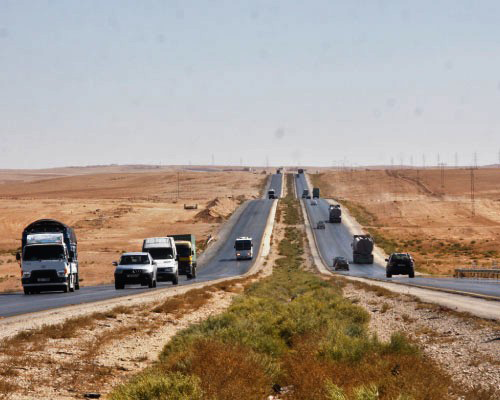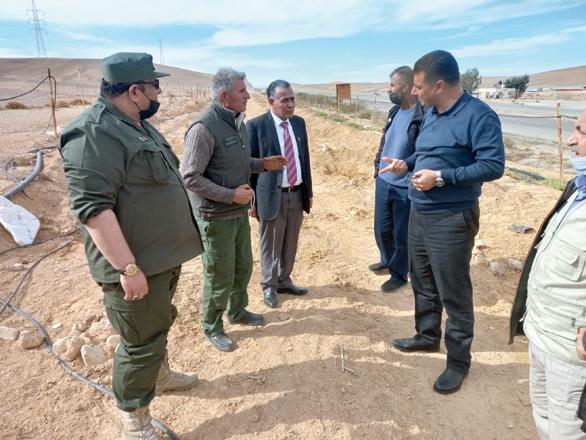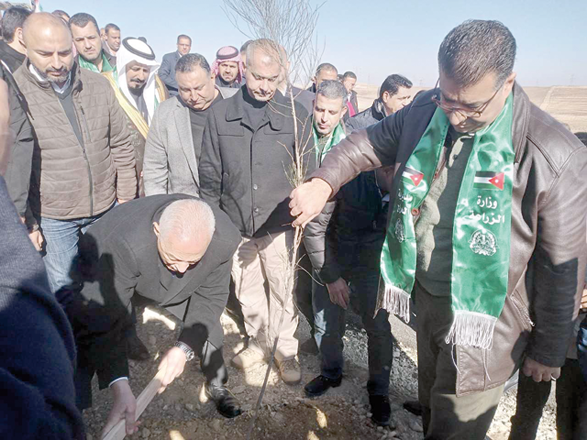You are here
Ministry of Agriculture mulls project to increase green cover using wastewater
By Heba Elayyan - Feb 04,2024 - Last updated at Feb 04,2024

The Ministry of Agriculture says that it is planning to launch a project to utilise fuel stations wastewater to plant fast-growing trees, beginning with the Desert Highway (JT file photo)
AMMAN — In bid to increase green cover in desert areas and in urban areas, the Ministry of Agriculture is planning to launch a project to utilise fuel stations wastewater to plant fast-growing trees, beginning with the Desert Highway.
The project is to be implemented jointly with the Energy and Minerals Regulatory Commission (EMRC).
The project was discussed during a meeting last week between Minister of Agriculture Khalid Hneifat and Chairman of the Board of Commissioners of the EMRC Ziad Saideh.
The meeting was also attended by representatives of fuel stations on the 315 kilometre Desert Highway, linking Amman with Aqaba.
Director of the Forestry Department Khaled Manasir said that the initial phase of the project will focus on the Desert Highway, where trees will be planted on both sides of the fuel stations using wastewater collected from these facilities.
Manasir added that the initiative aims to enhance the visual appeal of the Desert Highway and will also be implemented at the entrances of all governorates.
He also said that the proposed initiative is a component of the National Plan for Sustainable Agriculture, which includes projects across all governorates with the goal of planting 10 million trees over the next decade.
Acknowledging that the major challenge to the project is water scarcity, Manasir said that “the initiative excludes the use of drinking water due to the country’s difficult water conditions. Instead, treated water from companies like the National Poultry Company, which supplies the forest with up to 500 cubic metres daily, will be used”.
He also said that studies will be conducted to ensure that the water does not have adverse effects on the soil and fruit-bearing trees and that, if necessary, filtration and treatment stations will be used to customise the water to suit agricultural needs.
Managing Director at Manaseer Group Yasser Manaseer told The Jordan Times that Manseer fuel stations will collect used water from bathroom sinks before it enters the sewage system, adding that “there is a possibility of filtration, but it will not be widely used due to the cost and the absence of oil in the water to be used”.
Head of the Union of Environmental Societies Omar Shushan raised environmental concerns and stressed the need for a “scientific reevaluation” of the project, considering the nature of wastewater, its components, its impact on soil and plants, the selected area and whether the chosen plants are native or invasive.
For Shushan, the location of fuel stations is a primary concern.
“Most fuel stations are located within cities, leaving limited space for planting around them, while in arid areas, there is a space but the water quantity resulting from the stations is extremely low, posing a challenge to the sustainability of the project.”
He called on the agriculture ministry to prioritise native plants over invasive species, as controlling invasive species later on can be challenging.
Invasive plants are non-native species that have been introduced to a new environment, which can negatively impact ecosystems, biodiversity and even human activities.
“The project lacks an environmental perspective and ecological sustainability unless water is treated and national standards for agricultural use are established.”
Related Articles
AMMAN — Work on a project to plant trees on the sideways of the Desert Highway that links the capital to the southern governorates has comme
AMMAN — Agriculture Minister Khalid Hneifat on Saturday inspected the areas prepared for planting on Arbor Day on the sides of the Desert Hi
AMMAN — Deputising for His Majesty King Abdullah, Royal Court Chief Yousef Issawi on Monday presided over the official celebration of Arbour

















